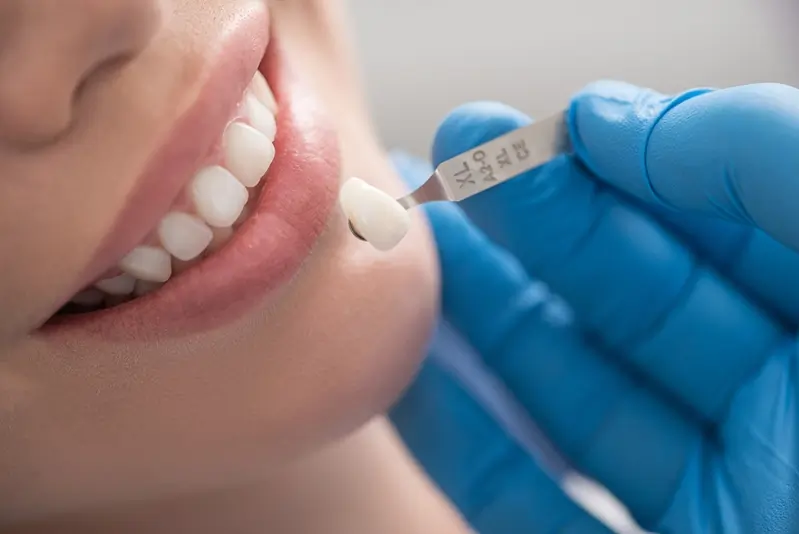If you've discovered one of your teeth has fractured or cracked, you might be wondering how severe your situation is. Breaking a tooth can be a pretty scary experience, and you might think about delaying seeing a dentist to avoid an extraction or any extensive dental surgery. However, you'll usually be better off seeking emergency dental care before a fracture can worsen.
In this article, we'll take a look at how teeth can break, whether fractured teeth can be salvaged and what options are available to treat a fractured or cracked tooth.
How can teeth break?
Teeth are naturally very strong, however can weaken over time due to plaque and bacteria wearing away the tough enamel layer. When this happens, teeth might fracture when eating particularly hard foods or grinding your teeth, for example. Otherwise, teeth may be fractured due to an impact such as being hit or falling during sports.
There are two main ways a tooth might break:
1. Cracked, but in one piece
When a cracked tooth doesn't hurt, it can be very hard to know there is a problem at all, so it's important to have regular dental check-ups.
Though your tooth is still one whole piece, there might be a crack, or cracks. A cracked tooth may or may not hurt, and is quite possibly not noticeable to the naked eye.
You'll most likely feel pain when biting down. If you suspect you have a cracked tooth, your dentist can use a special dye to highlight any possible cracks. When a cracked tooth doesn't hurt, it can be very hard to know there is a problem at all, so it's important to have regular dental check-ups.
Even when no pain is felt, the smallest crack can gradually worsen due to repeated biting forces, and lead to nerve damage. Alternatively, bacteria may enter the tooth through the crack and infect the pulp within, leading to the need for root canal treatment.
2. A piece has broken off (fractured)
A portion of your tooth may have broken off cleanly, or remain tethered only by the gums. A fracture like this should be treated as soon as possible. Doing so will often affect how simple or successful its repair will be.
If not treated immediately, the fracture may worsen or invite dental plaque and debris to accumulate. Should you be unable to visit a dentist with any urgency, try to avoid using the affected tooth as much as possible until you can seek treatment, and ensure you maintain your oral hygiene.

Can fractured teeth be salvaged?
Fractured teeth can be salvaged depending on the severity of the break. Minor tooth repairs include:
- Basic smoothing using a dental drill, such as when the chip is limited only to the enamel layer of the tooth.
- A small filling, or bonded restoration, can fill any larger albeit shallow fractures.
- Bonding the broken fragment back in to place may be offered sometimes, but is not very common.
Even in the case of larger fractures, you may not need to have the tooth extracted. Instead, your dentist may consider placing a larger filling, which would require some drilling first. However, they might worry that a filling could leave the tooth at risk of further damage, especially if there are any cracks in the tooth.
Alternatively, your dentist might suggest a dental crown. A dental crown is an excellent option for any tooth that could be at further risk, as it reinforces the existing tooth and root, without requiring total extraction and replacement. Essentially, what remains of the fractured tooth will be filed down to make space for a crown, which is a specially molded false tooth made from ceramic, metal or specialist material.
Dental crowns are aesthetically similar to natural teeth and should be cared for in the same way. They're also a less invasive and risky alternative to a full implant, as you maintain the root of your natural tooth and can typically have the work completed in just two appointments.
Note that a tooth may not always be salvageable. For example, if a fracture extends below the gum line, surgery will be required. You'll know this is the case if part of the tooth is attached only by the gums. Other problematic fractures may occur if the damage reaches the pulp chamber of the tooth, in which case you will require root canal treatment.

Can cracked teeth be salvaged?
Surface-level cracks may not be as severe as you think. In some cases, the solution is simply to take the tooth out of occlusion. This means filing the tooth down to reduce the amount of biting pressure it receives as you eat.
Otherwise, your dentist might consider a dental crown. Because the crown cups the whole tooth above the gum line, it effectively splints the cracked tooth together to alleviate symptoms and prevent worsening.
As with fractures, any crack that extends below the gum line or reaches the pulp chamber of the tooth is likely to require gum surgery and/or root canal treatment.
Minimising fractured or cracked tooth pain
If you're experiencing a fracture or cracked tooth but don't, for any reason, feel you can seek immediate treatment, it's nonetheless vital you speak to a dental professional about your situation.
A dentist can recommend the best pain relief and oral hygiene patterns to help you minimise further damage and alleviate symptoms until you can undergo any necessary procedure. As mentioned above, sometimes the solution may even be as simple as shortening the tooth – which can often be done in the same appointment.
Should you find yourself worried about a dental fracture or crack, reach out to the team at City Dentists on 04 978 4964 or book an appointment online to seek relief as soon as possible.
